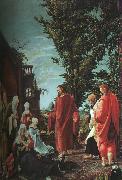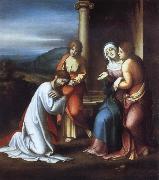Wholesale Oil Painting No Minimum |
|||||||||||
|
|
|||||||||||

|
|||||||||||
|
|
|
||||||||
Albrecht AltdorferGerman 1480-1538 Albrecht Altdorfer Galleries He most often painted religious scenes, but is mainly famous as the first frequent painter of pure landscape, and also compositions dominated by their landscape. Taking and developing the landscape style of Lucas Cranach the Elder, he shows the hilly landscape of the Danube valley with thick forests of drooping and crumbling firs and larches hung with moss, and often dramatic colouring from a rising or setting sun. His Landscape with footbridge (National Gallery, London) of 1518-20 is claimed to be the first pure landscape in oil. He also made many fine finished drawings, mostly landscapes, in pen and watercolour. His best religious scenes are intense, sometimes verging on the expressionistic, and often depict moments of intimacy between Christ and his mother, or others. His most famous religious artwork is the The Legend of St. Sebastian and the Passion of Christ that decorated the altar in the St. Florian monastery in Linz, Austria. He often distorts perspective to subtle effect. His donor figures are often painted completely out of scale with the main scene, as in paintings of the previous centuries. He also painted some portraits; overall his painted oeuvre was not large. |
||||||||
|
|
||||||||
Christ Taking Leave of His Mother
Christ Taking Leave of His Mother Painting ID:: 2296 |
1520 1520 |
|||||||
|
|
||||||||
CorreggioItalian 1489-1534 Correggio Locations Italian painter and draughtsman. Apart from his Venetian contemporaries, he was the most important northern Italian painter of the first half of the 16th century. His best-known works are the illusionistic frescoes in the domes of S Giovanni Evangelista and the cathedral in Parma, where he worked from 1520 to 1530. The combination of technical virtuosity and dramatic excitement in these works ensured their importance for later generations of artists. His altarpieces of the same period are equally original and ally intimacy of feeling with an ecstatic quality that seems to anticipate the Baroque. In his paintings of mythological subjects, especially those executed after his return to Correggio around 1530, he created images whose sensuality and abandon have been seen as foreshadowing the Rococo. Vasari wrote that Correggio was timid and virtuous, that family responsibilities made him miserly and that he died from a fever after walking in the sun. He left no letters and, apart from Vasari account, nothing is known of his character or personality beyond what can be deduced from his works. The story that he owned a manuscript of Bonaventura Berlinghieri Geographia, as well as his use of a latinized form of Allegri (Laetus), and his naming of his son after the humanist Pomponius Laetus, all suggest that he was an educated man by the standards of painters in this period. The intelligence of his paintings supports this claim. Relatively unknown in his lifetime, Correggio was to have an enormous posthumous reputation. He was revered by Federico Barocci and the Carracci, and throughout the 17th and 18th centuries his reputation rivalled that of Raphael. |
||||||||
|
|
||||||||
|
|
Christ Taking Leave of His Mother
Christ Taking Leave of His Mother Painting ID:: 43012 |
mk170
1512-1513
Oil on canvas
86.7x76.5cm
mk170 1512-1513 Oil on canvas 86.7x76.5cm |
||||||
|
|
||||||||
|
Correggio Italian 1489-1534 Correggio Locations Italian painter and draughtsman. Apart from his Venetian contemporaries, he was the most important northern Italian painter of the first half of the 16th century. His best-known works are the illusionistic frescoes in the domes of S Giovanni Evangelista and the cathedral in Parma, where he worked from 1520 to 1530. The combination of technical virtuosity and dramatic excitement in these works ensured their importance for later generations of artists. His altarpieces of the same period are equally original and ally intimacy of feeling with an ecstatic quality that seems to anticipate the Baroque. In his paintings of mythological subjects, especially those executed after his return to Correggio around 1530, he created images whose sensuality and abandon have been seen as foreshadowing the Rococo. Vasari wrote that Correggio was timid and virtuous, that family responsibilities made him miserly and that he died from a fever after walking in the sun. He left no letters and, apart from Vasari account, nothing is known of his character or personality beyond what can be deduced from his works. The story that he owned a manuscript of Bonaventura Berlinghieri Geographia, as well as his use of a latinized form of Allegri (Laetus), and his naming of his son after the humanist Pomponius Laetus, all suggest that he was an educated man by the standards of painters in this period. The intelligence of his paintings supports this claim. Relatively unknown in his lifetime, Correggio was to have an enormous posthumous reputation. He was revered by Federico Barocci and the Carracci, and throughout the 17th and 18th centuries his reputation rivalled that of Raphael. Christ Taking Leave of His Mother mk170 1512-1513 Oil on canvas 86.7x76.5cm |
||||||||
|
|
||||||||
|
Prev Next
|
||||||||
|
|
||||||||
|
Related Paintings to Correggio :. |
||||||||
|
|
||||||||
|
CONTACT US |


